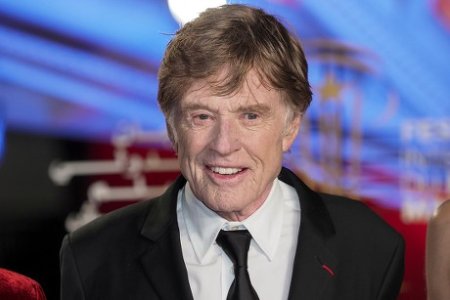From “Butch Cassidy” to Sundance—Hollywood icon Robert Redford dies at 89, leaving a legacy that shaped film and activism
- Replies 1
Robert Redford, the sun-kissed icon whose name became synonymous with both Hollywood glamour and indie grit, has left us at the age of 89.
For many, Redford was more than just a movie star—he was a force of nature, a champion for the underdog, and a guiding light for generations of filmmakers.
As we say goodbye to this cinematic trailblazer, let’s take a deeper look at the man behind the legend, his extraordinary journey, and the indelible mark he leaves on American culture.
Born Charles Robert Redford Jr. on August 18, 1936, in Santa Monica, California, Redford’s early years hinted at the restless spirit that would define his life.
With classic good looks and a mischievous twinkle in his eye, he seemed destined for the spotlight. But Redford’s path wasn’t always smooth.
He attended college on a baseball scholarship, only to lose it due to a bout of youthful rebellion. That setback, however, nudged him toward his true calling: the arts.
Redford’s first love was painting, and he studied at the American Academy of Dramatic Arts in New York. The stage soon beckoned, and by the late 1950s, he was making waves on Broadway.
Television roles followed—The Twilight Zone, Alfred Hitchcock Presents, and The Untouchables—before Hollywood came calling.
Redford became the face of a new kind of American leading man: rugged, thoughtful, and unafraid to show vulnerability.
His breakout came with Barefoot in the Park (1967), opposite Jane Fonda, but it was Butch Cassidy and the Sundance Kid (1969) that cemented his place in movie history.
Paired with Paul Newman, Redford’s Sundance Kid was sly, charming, and unforgettable—a role so iconic that it would later lend its name to his greatest off-screen legacy.
Hits like The Candidate, The Way We Were, and All the President’s Men followed, each showcasing Redford’s range and depth.
He wasn’t just a pretty face; he was a thinking man’s actor, drawn to stories with substance and social relevance. Redford brought a quiet intensity to every role, whether as a crusading journalist, a haunted war veteran, or a romantic lead.
Redford’s talents weren’t confined to acting. In 1980, he made his directorial debut with Ordinary People, a searing family drama that swept the Oscars, winning Best Picture and earning Redford the Best Director statuette.
Critics praised his sensitive touch and ability to draw out nuanced performances, especially from Mary Tyler Moore in a career-defining role.
He continued to direct and produce films that challenged audiences and tackled big ideas: The Milagro Beanfield War, A River Runs Through It, Quiz Show, and The Horse Whisperer, to name a few.
Redford’s films often explored themes of family, morality, and the American experience, reflecting his own restless curiosity and independent spirit.
Perhaps Redford’s most enduring contribution to cinema is the Sundance Institute and its famed film festival. Frustrated by Hollywood’s increasing risk aversion in the 1970s, Redford dreamed of a place where new voices could be heard and unconventional stories could thrive.
In 1981, he founded the Sundance Institute in the mountains of Utah, transforming a sleepy ski town into the beating heart of American independent film.
Sundance became a launchpad for now-legendary directors like Quentin Tarantino, Steven Soderbergh, Paul Thomas Anderson, and Darren Aronofsky.
It was a place where scrappy, low-budget films like The Blair Witch Project and Napoleon Dynamite could find an audience—and sometimes, outshine the Hollywood blockbusters.
Redford fiercely protected the festival’s spirit of independence, even as it grew into a global phenomenon. “For me, the word to be underscored is ‘independence,’” he once said.
“I’ve always believed in that word.” His commitment to diversity and artistic freedom helped reshape the film industry, giving countless artists their first big break.
Also read: Bobby Hart, songwriter behind the Monkees’ biggest hits and Boyce & Hart member, dies at 86
Redford’s passions extended far beyond the silver screen. A lifelong environmentalist, he was inspired by the transformation of his native Los Angeles from a sun-drenched paradise to a smog-choked metropolis.
He lobbied for landmark legislation like the Clean Air Act and Clean Water Act, championed land conservation in Utah, and served on the board of the Natural Resources Defense Council.
He was also a vocal advocate for political and social causes, using his fame to shine a light on issues from climate change to government transparency. In 2015, he addressed the United Nations, urging world leaders to take action on global warming. Redford’s activism was never just for show—it was woven into the fabric of his life and work.
Redford’s personal life was marked by both joy and heartbreak. He was married twice, most recently to artist Sibylle Szaggars, and was the father of four children.
He endured the loss of two sons: Scott, who died in infancy, and James, a filmmaker and activist who passed away in 2020. Through it all, Redford remained fiercely private, preferring to let his work speak for itself.
Even as he stepped back from acting in his later years, Redford continued to inspire. His 2013 performance in All is Lost, a nearly wordless tour de force, earned some of the best reviews of his career.
Also read: Graham Greene, Oscar-nominated star of "Dances With Wolves," dies at 73
In 2018, he bid farewell to acting with The Old Man and the Gun, a fitting swan song for a man who always played by his own rules.
Redford’s influence can be felt everywhere: in the rise of independent cinema, in the environmental movement, and in the generations of actors and filmmakers who followed in his footsteps.
He received an honorary Oscar in 2002, with the Academy hailing him as “inspiration to independent and innovative filmmakers everywhere.”
Read next: Remembering Polly Holliday: The unforgettable star behind Flo from Alice

Did you fall in love with him in The Way We Were? Did you discover a new favorite film at Sundance? Or perhaps you were inspired by his activism and commitment to making the world a better place.
For many, Redford was more than just a movie star—he was a force of nature, a champion for the underdog, and a guiding light for generations of filmmakers.
As we say goodbye to this cinematic trailblazer, let’s take a deeper look at the man behind the legend, his extraordinary journey, and the indelible mark he leaves on American culture.
Born Charles Robert Redford Jr. on August 18, 1936, in Santa Monica, California, Redford’s early years hinted at the restless spirit that would define his life.
With classic good looks and a mischievous twinkle in his eye, he seemed destined for the spotlight. But Redford’s path wasn’t always smooth.
He attended college on a baseball scholarship, only to lose it due to a bout of youthful rebellion. That setback, however, nudged him toward his true calling: the arts.
Redford’s first love was painting, and he studied at the American Academy of Dramatic Arts in New York. The stage soon beckoned, and by the late 1950s, he was making waves on Broadway.
Television roles followed—The Twilight Zone, Alfred Hitchcock Presents, and The Untouchables—before Hollywood came calling.
Redford became the face of a new kind of American leading man: rugged, thoughtful, and unafraid to show vulnerability.
His breakout came with Barefoot in the Park (1967), opposite Jane Fonda, but it was Butch Cassidy and the Sundance Kid (1969) that cemented his place in movie history.
Paired with Paul Newman, Redford’s Sundance Kid was sly, charming, and unforgettable—a role so iconic that it would later lend its name to his greatest off-screen legacy.
Hits like The Candidate, The Way We Were, and All the President’s Men followed, each showcasing Redford’s range and depth.
He wasn’t just a pretty face; he was a thinking man’s actor, drawn to stories with substance and social relevance. Redford brought a quiet intensity to every role, whether as a crusading journalist, a haunted war veteran, or a romantic lead.
Redford’s talents weren’t confined to acting. In 1980, he made his directorial debut with Ordinary People, a searing family drama that swept the Oscars, winning Best Picture and earning Redford the Best Director statuette.
Critics praised his sensitive touch and ability to draw out nuanced performances, especially from Mary Tyler Moore in a career-defining role.
He continued to direct and produce films that challenged audiences and tackled big ideas: The Milagro Beanfield War, A River Runs Through It, Quiz Show, and The Horse Whisperer, to name a few.
Redford’s films often explored themes of family, morality, and the American experience, reflecting his own restless curiosity and independent spirit.
Perhaps Redford’s most enduring contribution to cinema is the Sundance Institute and its famed film festival. Frustrated by Hollywood’s increasing risk aversion in the 1970s, Redford dreamed of a place where new voices could be heard and unconventional stories could thrive.
In 1981, he founded the Sundance Institute in the mountains of Utah, transforming a sleepy ski town into the beating heart of American independent film.
Sundance became a launchpad for now-legendary directors like Quentin Tarantino, Steven Soderbergh, Paul Thomas Anderson, and Darren Aronofsky.
It was a place where scrappy, low-budget films like The Blair Witch Project and Napoleon Dynamite could find an audience—and sometimes, outshine the Hollywood blockbusters.
Redford fiercely protected the festival’s spirit of independence, even as it grew into a global phenomenon. “For me, the word to be underscored is ‘independence,’” he once said.
“I’ve always believed in that word.” His commitment to diversity and artistic freedom helped reshape the film industry, giving countless artists their first big break.
Also read: Bobby Hart, songwriter behind the Monkees’ biggest hits and Boyce & Hart member, dies at 86
Redford’s passions extended far beyond the silver screen. A lifelong environmentalist, he was inspired by the transformation of his native Los Angeles from a sun-drenched paradise to a smog-choked metropolis.
He lobbied for landmark legislation like the Clean Air Act and Clean Water Act, championed land conservation in Utah, and served on the board of the Natural Resources Defense Council.
He was also a vocal advocate for political and social causes, using his fame to shine a light on issues from climate change to government transparency. In 2015, he addressed the United Nations, urging world leaders to take action on global warming. Redford’s activism was never just for show—it was woven into the fabric of his life and work.
Redford’s personal life was marked by both joy and heartbreak. He was married twice, most recently to artist Sibylle Szaggars, and was the father of four children.
He endured the loss of two sons: Scott, who died in infancy, and James, a filmmaker and activist who passed away in 2020. Through it all, Redford remained fiercely private, preferring to let his work speak for itself.
Even as he stepped back from acting in his later years, Redford continued to inspire. His 2013 performance in All is Lost, a nearly wordless tour de force, earned some of the best reviews of his career.
Also read: Graham Greene, Oscar-nominated star of "Dances With Wolves," dies at 73
In 2018, he bid farewell to acting with The Old Man and the Gun, a fitting swan song for a man who always played by his own rules.
Redford’s influence can be felt everywhere: in the rise of independent cinema, in the environmental movement, and in the generations of actors and filmmakers who followed in his footsteps.
He received an honorary Oscar in 2002, with the Academy hailing him as “inspiration to independent and innovative filmmakers everywhere.”
Read next: Remembering Polly Holliday: The unforgettable star behind Flo from Alice
Key Takeaways
- Robert Redford, the Oscar-winning actor, director, and founder of the Sundance Institute, has died at his home in Utah at the age of 89.
- Redford rose to fame in the 1960s and ’70s with iconic films like Butch Cassidy and the Sundance Kid, The Sting, and All the President’s Men, and later turned his focus to directing, winning the Best Director Oscar for Ordinary People.
- As the creator of the Sundance Film Festival, Redford was a champion for independent filmmakers, helping to launch the careers of major directors such as Quentin Tarantino and Steven Soderbergh.
- Redford was remembered not only for his significant contributions to film and the environment but also for his advocacy on issues like climate change and his commitment to supporting new creative talent.







